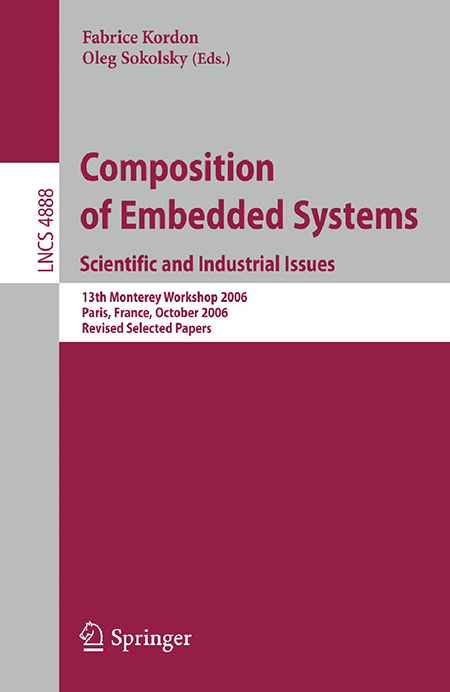Yr_2006_13th - Monterey Workshop
13th Monterey Workshop: Composition of Embedded Systems: Scientific and Industrial Issues (2006)
Software is the new physical infrastructure of the information age. It is fundamental to economic success, scientific and technical research and national security. Our current ability to construct the large and complex software systems demanded for continued economic and military success are inadequate.
Embedded Systems are becoming more and more present in our day-to-day life. In particular, they are the foundation of numerous critical functions, such as in automotive, satellite or aircraft systems. Such systems are difficult to build since reliability must cope with numerous constraints such as memory footprint or strict time schedule.
Moreover, embedded systems are now combined together to build larger ones also as networked systems (such as sensor networks). We are now in a process where the area of DRE (Distributed Real-time Embedded Systems) is coming out from very specialized areas to become natural in normal applications.
However, such systems require even more specific techniques to be developed. These techniques come from both the real-time/embedded and the distributed communities. I fact, numerous new problems must be addressed: integration of components, managing concurrency, new definition of the "real-time" concept (to support distribution), new runtime infrastructures, development methodologies, safe and deterministic behavior, etc.
This workshop, will address scientific and practical aspects of the development of distributed real-time embedded systems. The workshop will be the 13th in the Monterey workshop series, initiated in 1993 and devoted to exploring the critical problems associated with cost-effective development of high-quality software systems. Monterey workshops have a rich history of bringing together both American and European scientists that share a common interest in seeing that software development research serves as a catalyst for practical advances in next-generation software intensive systems. These workshops have been highly praised by participants for their high quality of presentations and discussions and given rise to many new collaborations that have significantly advanced the field.
The last few years the workshop has been held alternately in Europe and the United States. This year, the workshop will be held in Paris, France on October 16-18, 2006.
Download the Proceedings here.
Workshop Topics
- Model-driven development for DRE systems. Modeling and model-driven development (MDD) are of particular importance for DRE systems, because of their dependence on continuously evolving environments and strict requirements that need to be specified precisely for testing and verification.
- Balancing cost and assurance in DRE systems. High assurance comes at a high cost. System developers need to balance development costs and assurance levels depending on the criticality of particular system aspects. This area has not received enough attention from the research community and system developers lack proper tools to reason about such trade-offs.
- Domain-specific languages for DRE systems. Domain-specific languages (DSL) allow designers to represent systems directly using concepts from their application domains. Because of this, models and designs are easier to understand and validate, increasing confidence in the system. Research on DSL has been very active recently, yet many open questions remain, including semantic definitions for DSLs and correctness of model transformations with respect to the language semantics.
- Composition of real-time components. Timing and resource constraints, prevalent in DRE system development, make composition much more difficult. Component interfaces that are the basis for system integration now have to expose not only the input and output behaviors of the component, but also its resource demands. Formalisms that are used to reason about composition need to be able to capture the notion of resources and resource scheduling.
- Fault tolerance for DRE. Dealing with emergency situations is a major part of the DRE operation. The handling of faults and other abnormal events consumes a major portion of the system development efforts and represents the vast majority of code in a system implementation. At the same time, most model-driven approaches concentrate on the functional aspects of system behavior and the nominal environment.
Steering Committee
The Monterey Workshop Community has a long history of productive, high-quality workshops, directed by an international steering committee consisting of leaders in the field of software engineering and formal methods under the visionary leadership of David Hislop from the Army Research Office:
- David Hislop, Army Research Office
- Luqi, Naval Postgraduate School, Monterey, California
- Zohar Manna, Stanford University
- Manfred Broy, Technical University Munich, Germany
- Egidio Astesiano, University of Genova, Italy
- Fabrice Kordon, University of Pierre & Marie Curie, Paris, France
- Janos Sztipanovits, Vanderbilt University
- Hermann Kopetz, Vienna University of Technology
Workshop Chairs
- Fabrice Kordon of the Universite Pierre & Marie Curie, France
- Oleg Sokolsky of the University of Pennsylvania, USA
Local arrangements
- Fabrice Kordon of the Universite Pierre & Marie Curie, France.
Technical Program Committee
- Beatrice Berard, Universite Dauphine, France
- Valdis Berzins, Naval Postgraduate School, USA
- Juan de la Puente, Universidad Politecnica de Madrid, Spain
- Gabor Karsai, Vanderbilt Universiy, USA
- Insup Lee, Pennsylvania University, USA
- Edward Lee, University of California at Berkeley, USA
- Tom Maibaum, King's College, London, UK
- Joseph Sifakis, Verimag, France
- Henny Sipma, Stanford, USA
- Francois Terrier, CEA-LIST, France

Fabrice Kordon, Oleg Sokolsky (Eds.): Composition of Embedded Systems. Scientific and Industrial Issues, 13th Monterey Workshop 2006 Paris, France, October 16-18, 2006, Revised Selected Papers, Springer LNCS 4888, ISBN 978-3-540-77418-1. DOI: https://doi.org/10.1007/978-3-540-77419-8

